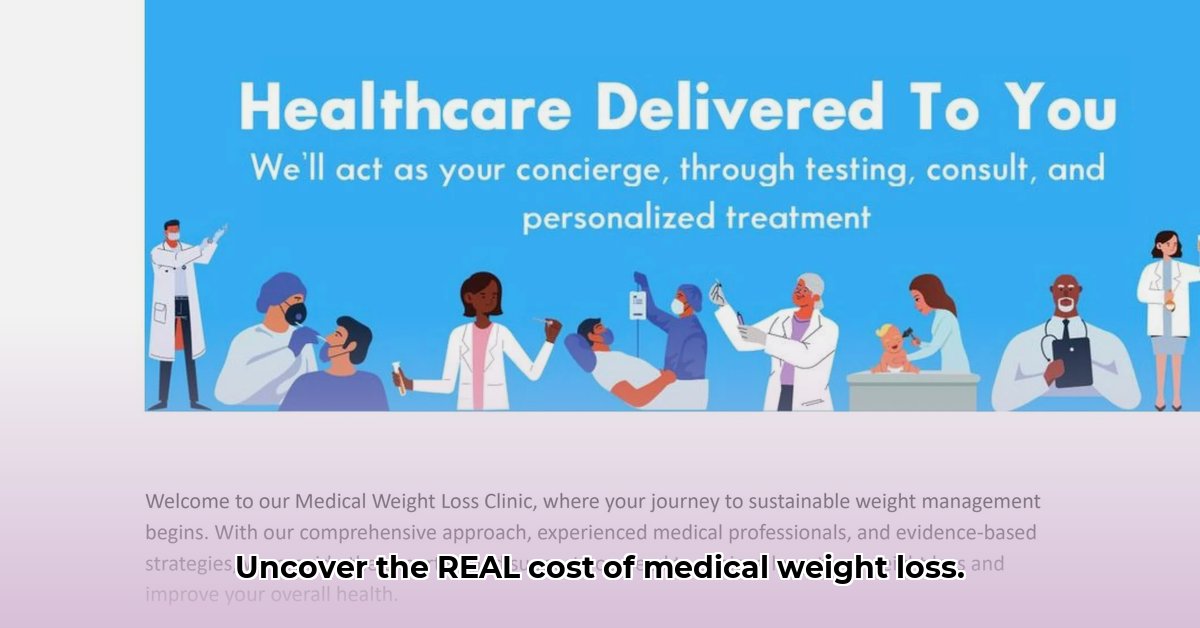
Losing weight with professional medical help can be a transformative experience, but the cost can be a significant concern. This guide provides a comprehensive look at the price of medical weight loss programs, comparing different models and highlighting factors influencing the overall expense. Expect costs ranging from several hundred to several thousand dollars annually, depending on several key factors.
Understanding the Cost Landscape: Weight Watchers vs. Medical Weight Loss Clinics (MWLCs)
Two prominent approaches to medical weight loss are represented by programs like Weight Watchers and standalone Medical Weight Loss Clinics. Their approaches and pricing structures differ significantly.
Weight Watchers often integrates a behavioral modification program with access to prescription weight-loss medications, such as semaglutide (brand name Wegovy or Ozempic), or other GLP-1 receptor agonists. The medication cost, however, isn't always transparent upfront and can significantly impact the total expense. Insurance coverage varies widely, influencing your out-of-pocket cost. Weight Watchers also offers tiered programs, with higher-tier programs generally costing more.
MWLCs offer a wider array of services, including prescription medications, nutritional counseling, and medical monitoring. While initial advertising may present lower upfront costs, added fees for supplements, additional treatments, or prolonged program durations can quickly increase the overall cost. Lack of transparency in pricing from certain clinics makes cost comparison difficult.
Factors Influencing Medical Weight Loss Costs
Several key factors determine the final cost of your weight loss journey:
- Program Length: Longer programs naturally incur higher costs.
- Level of Medical Supervision: More frequent check-ups and consultations increase expenses.
- Treatment Modalities: The type of treatment (medication, supplements, behavioral therapy) significantly impacts cost. Medication like Wegovy or Ozempic can be very expensive.
- Individual Needs: Customized programs tailored to individual needs may cost more but potentially yield better, more sustainable results.
- Geographic Location: Access to specific medications (e.g., compounded semaglutide) can vary regionally, affecting costs.
Insurance Coverage and Hidden Costs
Health insurance can substantially affect your out-of-pocket expenses. Many plans offer partial coverage for weight loss treatments, but coverage levels and requirements vary significantly. Check your policy details carefully; pre-authorization is often required. Health Savings Accounts (HSAs) and Flexible Spending Accounts (FSAs) can offset costs.
Be mindful of potentially hidden costs:
- Travel expenses: Transportation to and from the clinic.
- Parking fees: Costs associated with parking at the clinic.
- Additional supplements: Clinics may recommend supplements not included in the program's initial cost.
Cost Comparison: A Snapshot
The following table provides a general cost comparison. Actual costs will vary widely based on individual circumstances and chosen programs. Always obtain a detailed cost breakdown directly from the provider before committing to a program.
| Clinic Model | Program Type | Estimated Annual Cost Range | Medication Included? | Insurance Coverage? |
|---|---|---|---|---|
| Weight Watchers | Behavioral Modification & Medication Options | $500 - $5000+ | Often (but varies) | Varies widely |
| Medical Weight Loss Clinic | Varies (Medication, Counseling, Monitoring) | $1000 - $5000+ | Varies | Varies widely |
Making an Informed Decision
Choosing a medical weight loss program is a significant decision. Don't base your choice solely on price. Consider the following:
- Obtain multiple quotes: Compare prices and services from different clinics.
- Review your insurance coverage: Understand your plan's coverage for weight loss treatments.
- Consult your healthcare provider: Discuss your goals, health status, and budget to determine the best approach for you.
- Factor in all costs: Include hidden expenses such as travel and supplements in your budget estimations.
- Prioritize program effectiveness: A program's success rate and long-term effect should be key factors, even if it costs more.
By carefully considering these factors, you can make an informed decision that aligns with your health goals and financial resources. Remember, a sustainable weight loss journey is about more than just price; it's about choosing the right program for you.